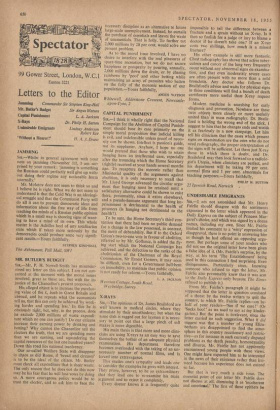MR. BUTLER'S BUDGET Sue—Mr. P. H. Nowell-Smith has misunder- stood
my letter on this subject. I am not con- cerned at the moment with /the moral issues involved, great as these are, but with the in- justice of the Chancellor's present proposals.
His alleged object is to increase the purchas- ing value of the £, both in Great Britain and abroad, and he repeats what the economists tell us, that this can only be achieved 'by work- ing harder and spending less.' In this he is obviously right, but, why, in the process, does he exclude 2,000 millions of waste expendi- ture which no one can justify? Do our citizens increase their earning power by drinking and betting? Why cannot the Chancellor tell the electors the truth, that we are spending HMV than we are earning, and squandering the capital resources of the last one hundred years? Down this road lies national insolvency.
Our so-called Welfare State will disappear in chaos as did Rome, if 'bread and circuses' is to be the ideal of the citizen. Mr. Butler must check all expenditure that is sheer waste. The only reason that he does not do this now may be his fear that he will lose votes by doing so. A more courageous policy would be to trust the elector, and to ask him to face the accessary discipline as an alternative to future large-scale unemployment. Instead, he curtails the purchase of essentials and leaves the waste of unessentials. That is folly. To further tax 2,000 millions by 20 per cent, would solve our present problem.
As to the moral issue involved, I have no desire to interfere with the real pleasures of spare-time recreation, but we do not secure happiness or prosperity by pouring, annually, 2,000 millions down the drain, or. by chasing rainbows by 'pool' and other betting while maintaining an army of parasites who batten on the folly of the moronic aection of our population.—Yours faithfully, ANGUS WATSON Whitewell, Adderstone Crescent, Newcastle- upon-Tyne, 2










































































 Previous page
Previous page